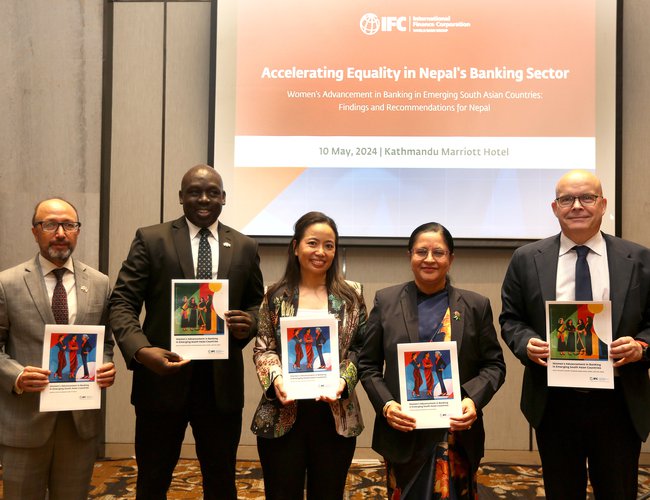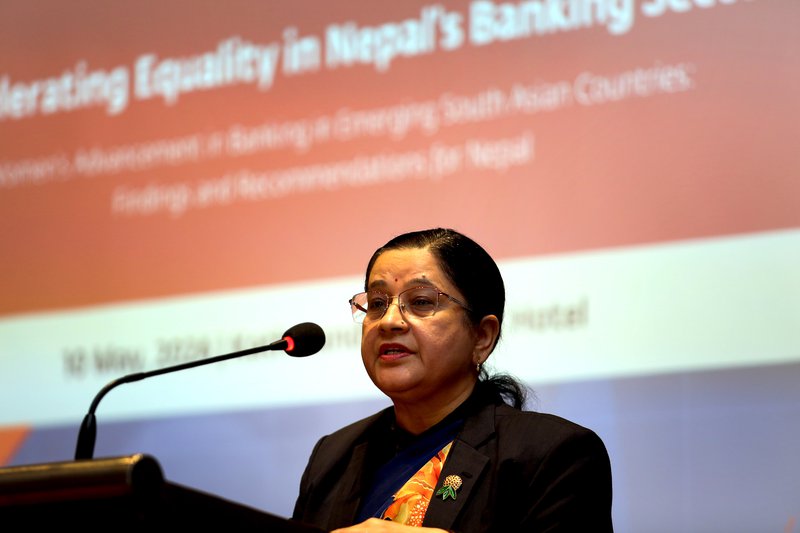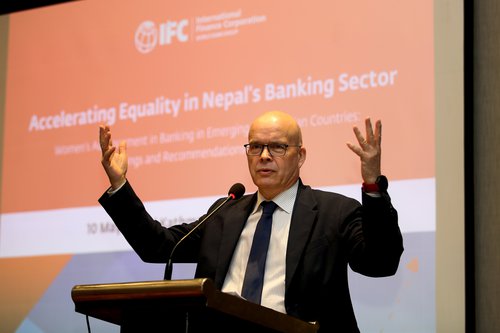
With 46 percent female representation in its entry-level workforce, the banking industry in Nepal is ahead of other countries in South Asia in achieving gender parity. However, only 23 percent of senior management roles are held by women, according to a new IFC report that examines gender diversity at six leading banks in Nepal.
The study—among the first of its kind in the region— identifies opportunities that can enable more women to advance to senior roles in the banking industry in South Asia.
This multi-country study, Women’s Advancement in Banking in Emerging South Asian Countries, focuses on commercial banks in Bangladesh, Nepal, and Sri Lanka, where women constitute 30 percent of the banking sector’s workforce compared to the global average of 52 percent. The report underlines how several barriers—inequitable hiring, inadequate professional development, lack of fair evaluations, sociocultural constraints, and others—curtail women’s career growth prospects across the region.

“Diversity, equity, and inclusion are central to IFC’s work values. Through nuanced, data-driven insights emerging from this new report, we hope to deepen the industry discourse around steps that need to be taken to improve the status of women in the banking workforce across South Asia,” said Martin Holtmann, IFC Country Manager for Nepal, Bangladesh, and Bhutan.
In Nepal, women hold 42 percent of all positions in surveyed commercial banks. Comparable figures for Sri Lanka and Bangladesh are at 38 percent and 18 percent respectively. In senior management roles, women hold 23 percent of executive positions in Nepali banks, compared to 20 percent in Sri Lanka and 12 percent in Bangladesh.
Past studies have shown that commercial banks that have 15 percent or more women in senior manager or higher roles, command up to 33 percent higher return on equity than banks that do not. A growing body of evidence further links an increase in women’s representation in organizations to better performance on business metrics.
Accordingly, IFC's key findings and recommendations intended to help industry actors—executive managers in commercial banks, policymakers, industry bodies, and investors—direct their efforts to boost women’s representation in leadership in the banking industry.

The report recommends targeted efforts in four areas by banks and industry actors. These include establishing clear organizational commitments for gender diversity, the support system for women to reach leadership positions, policy changes to ensure workplace safety, and initiatives to support women's professional development and work-life balance.
“Nepal has a strong legal framework to promote women’s economic participation in the country. And these provisions are more comprehensive than other countries in South Asia,” said Holtmann. “While these progressive policies have allowed Nepal to be a leader in the region, more needs to be done to increase the number of women in leadership positions and to reach gender parity.”

IFC’s $56 million loan to Global IME Bank Limited in February 2024 earmarked 25 percent towards supporting women-owned small and medium enterprises (SMEs). Additionally, IFC investment in various banking and financial sector clients such as NMB Bank, Sanima Bank, and Siddhartha Bank have been able to provide economic opportunities, and financial services to SMEs including those led by women.
- EU Ambassador To Nepal Veronique Lorenzo Paid A Courtesy Call On Rana
- Jul 27, 2024
- 139 People Died In The Disaster
- Jul 27, 2024
- Monetary Policy Eases Managing Capital Fund Stress
- Jul 27, 2024
- Weather Forecast: Chances Of Heavy Rainfall Is Likely In One Or Two Places Of Sudu Paschim And Bagmati Province
- Jul 27, 2024
- The Sentiment Of Monetary Policy Seems Focused On Increasing Eemand: FNCCI President Chandra Prasad Dhakal
- Jul 26, 2024
















